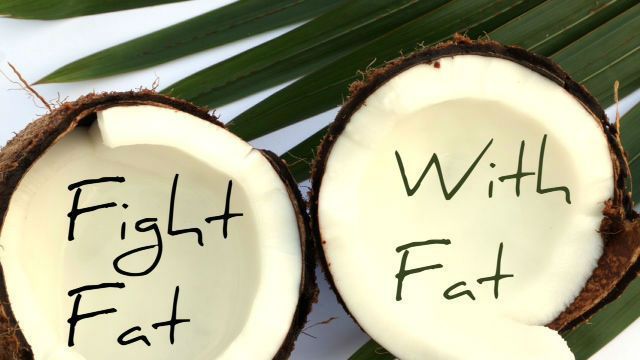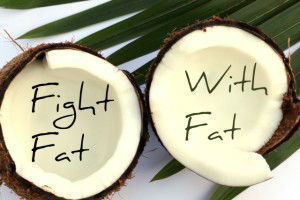
Fact: Americans have reduced their saturated fat consumption by 10 percent in the last 30 years, and obesity has doubled.
Our nation – even our children – is growing increasingly larger and illnesses such as diabetes, heart disease and cancer are rampant – something that we can no longer turn our backs on.
However, it may come as a surprise to learn that eating foods high in saturated fat, such as grass-fed meat, milk, free range eggs, butter, avocados, coconut, raw nuts and real cheese are not necessarily the causes of obesity, high cholesterol and heart disease, as was originally thought.
Numerous studies have been conducted that have been unable to provide any conclusive evidence that consuming foods high in saturated fat leads to heart disease. One study that spanned the globe studied the diets of the Maasai tribe of Kenya, the Eskimos in the Arctic, and the tribe of the three atoll islands off the coast of New Zealand, and found their diets consisted of more than 66 percent saturated fat. And yet, they have the lowest risk of heart disease.
Some cultures that consume mostly saturated fat from natural sources don’t even have a word for heart disease – no need for a word when the problem does not exist, right?
At one time, we adapted to eating a diet high in fat and low in carbs without any increased risk of heart disease. Today, we are told to consume a low fat diet and eat more carbs, yet heart disease is the number one killer in this country despite a lower fat diet.
Something seems inherently wrong with this picture, and researchers, nutritionists and consumers are now becoming aware of just how mixed up the saturated fat myth really is.
Debunking the lipid hypothesis
The theory that took saturated fats down appeared in the 1950s, and has been coined the “lipid hypothesis.” This hypothesis stated that there was an intimate relationship between saturated fat, cholesterol and heart disease.
This hypothesis was built on questionable evidence at best. Ancel Keys, the founder of the hypothesis, presented his “findings” to the medical community. Despite the lack of evidence and the prevalence of other studies finding different conclusions, the lipid hypothesis took fire.
Most of the fuel came from the food manufacturers and vegetable oil producers who saw great benefit in riding on this hypothesis. If everyone would stop using saturated fat, they could convince them that refined vegetable oil was healthy.
The truth is, almost 90 percent of all well-researched studies examining this hypothesis do not support the fact that saturated fats and dietary cholesterol cause heart disease. In fact, researchers have found that a clogged artery is about 26 percent saturated fat and more than half polyunsaturated fat.
So, if we are now starting to understand that saturated fat is not to blame for our heart disease epidemic, is it possible to see it in a new light, for what it is really valuable for?
Traditional saturated fats are really good for us
- Healthy saturated fats, found in traditional – not highly processed – foods, have been found to be of tremendous value to good health, in ways including:
- Liver support: Saturated fats help liver cells dump fat cells, which allows the organ to work better.
- Immunity booster: Saturated fatty acids, like those found in coconut and butter, help white blood cells seek and destroy viruses and bacteria.
- Hormone helper: Eating a consistent amount of healthy saturated fat helps to increase free testosterone levels, which repair tissue, improve sexual performance and preserve muscle.
- Fats are sources of essential fatty acids that are necessary for the absorption of vitamins A, D, E and K. They also help keep your hair and skin looking great and aid in proper cell function.
The real fat you should be scared of
Not all saturated fat is created equal. Some fats occur in nature, while others are artificially molded into a saturated form through a process known as hydrogenation.
Trans fatty acids, or trans fats as they are more commonly referred to, are “fake” fats that clog arteries, increase the levels of low density lipoproteins (LDL) and lower high density lipoproteins (HDL) in the blood. These deadly fat imposters are formed when vegetable oils harden to create shortening or margarine.
However, trans fats are prevalent in more foods than shortening and margarine, and we often consume them without knowing. Typical french fries, cookies, chips, frozen waffles, and crackers contain from 30 to 50 percent trans fatty acids. Donuts, an American staple, may contain up to 40 percent depending on the brand.
These dangerous fats are added to processed foods to make them more palatable, increase their shelf life and improve their flavor. In fact, 80 percent of trans fats come from processed foods, while the remainder comes from meat and dairy.
Is the donut really worth it? Serious health problems such as type 2 diabetes and heart disease thrive in the type of environment created by trans fatty acids.
Coconut oil… the world’s friendliest fat-busting, traditional saturated fat
Considered one of the healthiest foods on the planet, coconut oil is extracted from the kernel or meat of mature coconuts. It also contains saturated fat – in fact, it is a whopping 90 percent saturated fat. Don’t let that scare you; although you may be convinced that saturated fat should not be touched with a 10-foot pole – coconut oil is healthy.
Although there have been over 60 years of negative public policy around healthy saturated fats like those found in coconut oil, research and review of cultures that have used coconut oil for thousands of years tell a different story – healthy saturated fat can be highly beneficial.
Research demonstrates that the naturally occurring saturated fat found in coconut oil has some amazing therapeutic values, such as:
- Promoting heart health
- Boosting the immune system
- Providing immediate energy
- Promoting healthy skin
- Helping to regulate blood sugar
- Boosting metabolism
- Promoting weight loss
Coconut oil is vastly different from most other foods; it is comprised mainly of medium chain fatty acids, while most other foods contain long chain fatty acids. Medium chain fatty acids are metabolized much differently than longer chain fats found in modern-day seed/vegetable oils, processed shortenings and almost all highly refined foods.
Long chain fatty acids (LCFAs) are very difficult for the body to break down and can put a tremendous strain on the pancreas, liver and digestive system. In addition, LCFAs are stored mainly as fat in the body, and are deposited in arteries as cholesterol. In contrast, medium chain fatty acids (MCFAs), like those found in coconut oil, are easy to break down and are sent directly to the liver to be used for energy – they are not stored as fat.
Understanding the thermogenic power of coconut oil
Coconut oil packs tremendous thermogenic power when compared calorie for calorie to long chain fats.
One study demonstrated how just 1 to 2 tablespoons of MCFAs per day can increase energy expenditure by 120 calories per day. Other studies confirm the findings and clearly demonstrate that when we replace the current fats we are eating (including those found in processed foods) with MCFAs, we burn more calories – hands down.
Another added bonus of consuming raw, organic coconut oil is that it tends to make us feel fuller for longer. Studies indicate that MCFAs help increase feelings of fullness and lead to a reduction in calorie intake when compared to the same amount of calories from other fats. When MCFAs are metabolized, ketone bodies are created in the liver – these have been shown to have a strong appetite reducing effect.
 How to add coconut oil to your diet
How to add coconut oil to your diet
Coconut oil can replace all of the other oils in your kitchen. Raw, organic coconut oil remains solid at room temperature and does not break down during cooking. You can fry with it, bake with it, drizzle it on foods, saute with it – and also put it on your skin, hair, nails etc… There is no shortage of ways as to how coconut oil can truly improve your health – you can even add a tablespoon or so to your morning coffee for a great energy boost!
The days of badmouthing natural saturated fats are quickly coming to an end. We hope that this change of thought will prompt a change of behavior that will escort in better health for all who choose to believe!
Click here to learn more about the amazing benefits of raw, organic coconut oil. You will be awestruck by all of the ways this traditional saturated fat can benefit your health.
-The Alternative Daily
Sources:
Kaunitz H, Dayrit CS. Coconut oil consumption and coronary heart disease. Philippine Journal of Internal Medicine, 1992;30:165-171
http://www.ijpsr.com/V1I6/3%20Vol%201%20Issue%206%20Review%203.pdf

